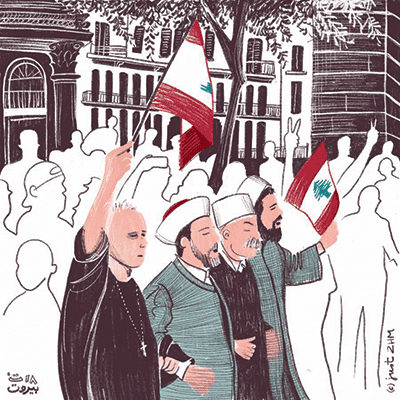THE LEBANESE PEOPLE: A MESSAGE OF FREEDOM AND AN EXAMPLE OF PLURALISM

THE ANSWER FROM… LEBANON
One of the world’s most inspiring revolutions has been underway in Lebanon since October 17, 2019. Provoked by the implementation of new taxes (for example on WhatsApp calls), it has brought together women and men, young and old, all social classes and all religious faiths. Millions have made their voices heard long and loud, debating in the streets at in universities, all bearing the same emblem, the national flag with its distinctive cedar, free of allegiances to political parties. Their slogan is unequivocal: “All means all.” The Lebanese are strongly united in their shared demands: for the government to resign and be replaced by independent technocrats, for an independent judiciary, and for scheduled elections. To make Lebanon a prosperous and corruption-free nation. As of late November 2019, they had only achieved the resignation of the Prime Minister (October 29), the election of a council of independent attorneys, and the cancelling of two parliamentary sessions that had been called to propose a dubious amnesty law. There is still much to be done.

Political leaders have profoundly disappointed the population. They haven’t been equal to the demands of Lebanese citizens nor to the country’s great cultural richness. This revolution marks the first time that so many of the Lebanese people have demanded a harmonious secular state free of political “confessionalism” (based on religious affiliations). Many government officials have used the current system solely for their own profit, which has resulted in a national debt totaling 150% of GDP. The Lebanese demand that funds sent offshore by corrupt politicians be returned to the country and they also demand an international audit of how international aid funding is being distributed. This is because current government leaders, re-elected a year and a half ago in an election with a 50% abstention rate, have failed to achieve necessary reforms, for example those stipulated by the CEDRE conference on international aid, and have instead imposed new taxes to reduce the deficit. Lebanon has been experiencing an economic crisis for years, and a parallel market for the Lebanese pound began to be developed in summer 2019. The Lebanese are well aware that if the current demonstrations continue, the national economy will be threatened. Local banks have already closed their doors for several days, limiting access to cash. Companies are reporting a 50% to 90% reduction in turnover and many private companies have been forced to lay off employees. The Lebanese also know that if the government continues to refuse to hear their demands, this peaceful revolution, which has nevertheless already caused the deaths of three people, could become a hunger revolution.
Everything about this revolution has been extraordinary, however, from demonstrators cleaning up Bayreuth’s Place des Martyrs every morning, taking care of the trash themselves, to their signs calling for freedom of expression, rights for women in the Arab world and more. If solutions for the problems aren’t found quickly, though, Lebanon will lose its own people, with many Lebanese as well as Syrian refugees heading for the European coastline. And hopes for a world living in harmony will be dashed. “Lebanon is more than a country: it’s a message of freedom and an example of pluralism for both East and West,” wrote Pope Jean-Paul II in 1989.
1. The “all” refers to politicians.
2. The Economic Conference for the Development of Lebanon through Reforms and with Companies (CEDRE) proposes grants and loans totaling US$ 11.6 billion, contingent on structural and budgetary reforms.

NICOLAS BOUKATHER (M.07)
With a Master’s diploma in Entrepreneurship from HEC, he is a member of the HEC Alumni committee, president of the Lebanese chapter of HEC Alumni, and chairman of A.N. Boukather Holding. Reporting from the home of the iconic cedar, he describes the revolution underway since October 2019 and explains the main grievances of the Lebanese people.
Published by Flavia Sanches

